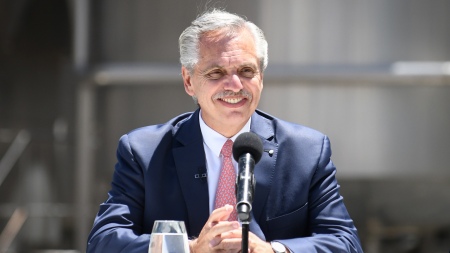The map that reveals how power is distributed within the government is apparently about to change. Since the last months of last year, we have been hearing about changes in the different ministerial portfolios. Even, at the end of January, the president of the PS, Paulina Vodanovic, declared that “there must be an adequate representation of what the participation of Democratic Socialism means in the Government, not only at the level of ministers and ministers”.
Currently, the composition of the Executive power map – from the President to the sub-secretaries – presents, up to now, a predominance of Approve Dignity in the positions. However, this could change during the first weeks of March.
At the starting point of the map is the President of the Republic, Gabriel Boric, who belongs to the Social Convergence (CS) party. Although he is accompanied by a team of advisers called “Second Floor”, it is difficult to determine who and how many frequently participate in said instance and their level of relevance. Among those whose active participation in presidential advisory can be confirmed are Miguel Crispi (RD) –who landed on the Second Floor after the departure of Lucía Dammert– and Carlos Durán (CS), who –on the 9th of January– arrived to occupy the position of Matías Meza-Lopehandía as chief of staff, the position closest to the President.
Now, these charges are more immovable than the ministries and undersecretariats, obviously. For any movement to occur in the Second Floor, a crisis similar to that of the pardons would be required or, well, that this same controversy has brought about some change for the month of March, something that has not been commented on.
A new air in the Executive ministries has been anticipated for months, which would bring another balance of powers in terms of the ruling party political parties and their presence in the various portfolios. Although there is no confirmed information, sources close to La Moneda say that there could be changes of sub-secretaries in March and that Democratic Socialism would be the coalition that would gain more prominence than it currently has. Regarding the ministries, some point out that it will be done in March, but information revealed by sources in the month of January affirmed that the changes of ministers would come after the election of constitutional advisers, in order to have a better reading of the electoral endorsements.
The map
Today, before March begins and with the end of the legislative recess just around the corner, the map of power is distributed as follows:
Of the 24 government ministries, nine belong to the Approve Dignity coalition. Among these, there are five positions held by co-religionists of President Boric of Convergencia Social; two for the Communist Party; two for Revolución Democrática and a portfolio in charge of the Comunes party.
The other ruling coalition, the Democratic Socialism, is in charge of eight ministries with their militants and three are occupied by people who are not members of their ranks, but who are close to the PS or the PPD. Among the portfolios that have members of Democratic Socialism at their head, three belong to the Party for Democracy, three to the Socialist Party, one to the Liberal Party and one to the Radical Party.
So, there are 20 ministries that have some more or less obvious political overtones, however, there are four portfolios in which their leader declares himself independent.
The balance, in terms of ministerial distribution, seems to be balanced. In fact, the historically called “strong ministries” are occupied mainly by representatives close to Democratic Socialism –Interior, Treasury and Segpres–, with the exception of the spokesperson Camila Vallejo, who belongs to the Communist Party. However, the criticisms made by the parties of the former Concertación to the Government pointed out that the balance of the sub-secretariats was uneven. It is that, today, 24 of the 38 sub-secretaries are commanded by a person from Approve Dignity, while Democratic Socialism has five positions. The other positions are occupied by undersecretaries who do not have a defined militancy.
Although the date for this is not yet clear, it is expected that there will be a significant change in the ministries, but even more so in the sub-secretariats. Sources close to the Government revealed that the preliminary conversations pointed to a change of balance in which the PS would keep eleven sub-secretaries and the PPD would have four. Here it is the detail of the map of power:
-Republic President: Gabriel Boric (CS)
-Ministry of the Interior and Public Security – Carolina Tohá (PPD)
- Nicolás Cataldo (PC) – Undersecretary of Regional Development
- Manuel Monsalve (PS) – Undersecretary of the Interior
- Eduardo Vergara (PPD) – Undersecretary for Crime Prevention
-Ministry of Foreign Affairs – Antonia Urrejola (close to PS)
- José Miguel Ahumada (Indep.) – Undersecretary of International Economic Relations
- Ximena Fuentes (CS) – Undersecretary of Foreign Affairs
-Ministry of National Defense – Maya Fernandez (PS)
- Galo Eidelstein (PC) – Undersecretary of the Armed Forces
- Gabriel Gaspar (PS) – Undersecretary of Defense
– Ministry of Finance – Mario Marcel (close to PS)
- Claudia Sanhueza (RD) – Undersecretary of Finance
-Ministry General Secretariat of the Presidency -Ana Lya Uriarte (PS)
- Macarena Lobos (close to DC) – Undersecretary General of the Presidency
-Ministry General Secretariat of Government -Camila Vallejo (PC)
- Valeska Naranjo (CS) – General Undersecretary of Government
-Ministry of Economy, Development and Tourism – Nicholas Grau (CS)
- Julio Salas (PS) – Undersecretary of Fisheries and Agriculture
- Javiera Petersen (PC) – Undersecretary of Economy and Smaller Companies
- Verónica Kunze (Indep.) – Undersecretary of Tourism
-Ministry of Social Development and Family – Giorgio Jackson (DR)
- Francisca Perales (CS) – Undersecretary of Social Services
- Paula Poblete (RD) – Undersecretary of Social Evaluation
- Yolanda Pizarro (PPD) – Undersecretary for Children
-Ministry of Education – Marco Antonio Avila (RD)
- Verónica Figueroa (Indep.) – Undersecretary of Higher Education
- Gabriel Bosque (PC) – Undersecretary of Education
- Claudia Lagos (Indep.) – Undersecretary of Early Childhood Education
-Ministry of Justice and Human Rights – Luis Cordero Vega (Indep., close to Democratic Socialism)
- Haydee Oberreuter (Indep.) – Undersecretary for Human Rights
- Jaime Gajardo (PC) – Undersecretary of Justice
-Ministry of Labor and Social Welfare – Jeannette Jara Roman (PC)
- Giorgio Boccardo (Common) – Undersecretary of Labor
-Ministry of Public Works – Juan Carlos Garcia (PL)
- José Herrera (Indep) – Undersecretary of Public Works
-Ministry of Health – Ximena Aguilera Sanhueza (Independent)
- Cristóbal Cuadrado Nahum (RD) – Undersecretary of Public Health
- Fernando Araos Dattoli (Indep.) – Undersecretary of Assistance Networks
-Ministry of housing and urbanism – Carlos Montes Cisternas (PS)
- Tatiana Rojas Leiva (RD) – Undersecretary of Housing and Urban Planning
-Department of agriculture – Esteban Valenzuela Van Treek (PPD)
- Jose Guajardo Reyes (FRVS)
-Ministry of Mining – Marcela Hernando Perez (PR)
- Willy Kracht Gajardo (CS) – Undersecretary of Mining
-Ministry of Transport and Telecommunications – Juan Carlos Muñoz (Independent)
- Cristóbal Pineda Andrade (RD) – Undersecretary of Transportation
- Claudio Araya San Martín (PC) – Undersecretary of Telecommunications
-Ministry of national goods – Javiera Toro (Common)
- Marilen Cabrera Olmos (Humanist Party) – Undersecretary of National Assets
-Ministry of energy -Diego Padrow (CS)
- Julio Maturana (PC) – Undersecretary of Energy
-Ministry of Environment – Maisa Rojas (Independent)
- Maximiliano Proaño (CS) – Undersecretary of the Environment
-Ministry of Sport – Alexandra Benado (Independent)
- Antonia Illanes (CS) – Undersecretary of Sport
-Ministry of Women and Gender Equity – Antonia Orellana (CS)
- Luz Vidal (Indep., close to the DR) – Undersecretary for Women and Gender Equity
-Ministry of Cultures, Arts and Heritage – Juliet Brodsky (CS)
- Andrea Gutiérrez (Indep.) – Undersecretary of Cultures and Arts
- Carolina Pérez (RD) – Undersecretary of Cultural Heritage
-Ministry of Science, Technology, Knowledge and Innovation – Silvia Diaz (PPD)
- Carolina Gainza (CS) – Undersecretary of Science, Technology and Innovation








